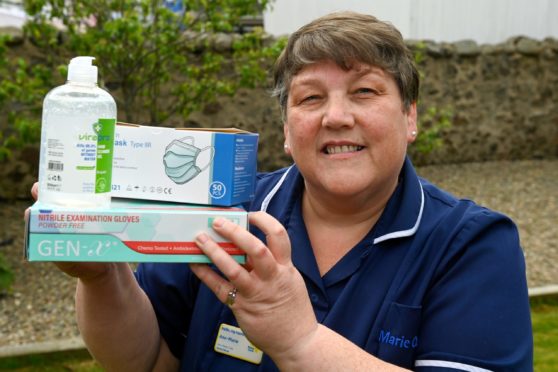Throughout the pandemic they’ve continued to work day and night to provide round-the-clock care for terminally-ill patients in their precious final days.
Despite numerous lockdowns across the north-east, dedicated Marie Curie nurses carried on tending to patients in need, making them as comfortable as possible at a time when the service came under “immense pressure”.
Today, Marie Curie managers from both Grampian and the Highlands have told of the difficulties staff have faced over the past year, which even saw nurses being unable to give patients a hug or hold their hand when they needed it most.
But aside from the constraints of social distancing, nurses still ensured their care went “above and beyond” in order to care for patients.
Lorraine Mackie, clinical nurse manager for Grampian, said the service faced additional pressure due to increased demand – with retired nurses even having to lend a hand throughout the pandemic.
‘We had to adapt to meet the needs of patients’
She said: “During the pandemic, the demand on the Marie Curie service and palliative care at home has been immense. The nursing teams had to adapt very quickly to different circumstances.
“There was an increase in people at home requiring end-of-life care for various reasons.
“So the demand on the service did become immense at that time because many people did want to stay at home, whether it was with a Covid diagnosis, or not, end-of-life care was still required in the community.
“The Marie Curie nurses went above and beyond and would travel many miles to see a patient in need.”
Marie Curie nurses care for patients with all terminal illnesses towards the end of their lives, providing comfort, administering pain relief and giving family carers respite.
Staff can also help patients, who can have complex needs with more than one illness, with their washing, dressing, mobility and with taking medicines.
‘The biggest change was not being allowed to hold their hand’
Lesley Middleton, clinical nurse manager for the Highlands, said all staff have “stepped up” throughout the pandemic and did “what they needed to do”.
She said: “Everybody got the care that they needed – PPE was sorted out really quickly.
“You would prioritise your patients, Covid and non-Covid in exactly the same way.
“If they needed care that night, the nurses would go. We still provided the same service to people whether they were Covid positive or not.”
The demand for palliative care initially reduced in the Highlands, but spiked during the second wave at the beginning of this year.
In total, 24 staff work in the north, many driving long distances to visit homes in remote communities.
Lesley added: “The biggest change and the thing that has been really difficult was wearing the PPE when you’re trying to do end-of-life care.
“Not being allowed to touch people, hold their hand or give them a cuddle, trying to communicate with them wearing a mask – that’s really difficult to do.
“The mask makes it less personal because they can’t see when you’re smiling. We’ve just had to adapt and our verbal communication became much more important.
“I think the staff are fantastic. Everybody just stepped up and did what they needed to do.
“Nobody said they didn’t want to go and see a patient, they’ve just been amazing.”
‘Our staff have been really brave’
Ann-Marie Craig, a senior Marie Curie nurse in Grampian, explained her role changed during the pandemic.
She helped to source PPE then delivered it to the homes of nurses and said managers spent a lot of time checking new guidelines brought in during the pandemic to make sure staff were safe.
“Our staff have been really brave…we had very few shielding,” she said.
“We still offered home visits wearing PPE and I think the staff were very aware that we weren’t asking them to do anything that we wouldn’t have done ourselves.
“I think our team has come out of it a lot stronger. We have a real sense of respect for each other, and definitely a respect for our nurses who are actually going in and sitting for hours in someone’s house on their own wearing that PPE.
“I think there’s a general feeling of high regard for those nurses.”
A huge thank you
Cabinet Secretary for Health and Social Care Humza Yousaf has thanked Marie Curie nurses for their work.
He said: “Marie Curie staff do a remarkable job in often very trying circumstances – providing care and support to those nearing the end of life with compassion, dignity and sensitivity when it is needed most.
“Even before the pandemic, every single one of us owed a massive debt of gratitude to those working tirelessly to provide high-quality end-of-life care, including Marie Curie staff – and that is even more so the case now.
“I want to say a huge thank you to our palliative and end of life care community and also Marie Curie staff for the selfless way they have kept the service running throughout the Covid-19 pandemic.”
